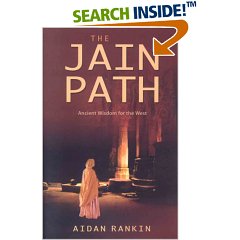
‘The Jain Path - Ancient Wisdom for the West’, published by O Books, Winchester UK and Washington, USA, 2006, 258 pp.
We are living in a time of severe stress from many sides – environmental, lifestyle, fundamentalism, over-population, greed and inequality. It seems the ‘progress’ of modernity requires severe qualifications, and even though we have nice sounding slogans like light footprint, sustainability, green living, we are more confused than ever. In the high-tech instantaneous world that we inhabit, most ‘solutions’ we seek require immediate results and returns. We are truly at a loss as to the lasting and sustainable way forward, although we may not want to admit it.
Fortunately, there is one dharma, which has been living and promoting an ethical lifestyle for thousands of years, quietly and determinedly. It is so different from Western world-views and philosophies, and written and practiced in ancient Indian languages of Sanskrit and Prakrit, that few have had the skills and resources to understand it and translate it to a Western audience. Those who have studied it have often misunderstood and misrepresented it, as its depth and wisdom have been so radically different.
Educated and trained in the UK, Aidan Rankin came across the Jain path through his friendship with me when we were doctoral students at the London School of Economics. He was always interested in spirituality, but resistant to fundamentalist belief systems – be it religious, political or social. Whilst working for six years as freelance writer for the Jain Spirit international magazine, he came across a range of different dimensions of the faith, met various people from the community and began a personal study and investigation. He was appointed a Guest Editor to one whole issue of the magazine, something that he was initially very surprised by, but a task he took on with great gusto. This to him was one of the boldest signals of the open-ness of the faith – that no-one feels that they are rightful owners or guardians of the faith, and that truth has multiple facets and should be sought from all directions and peoples.
‘The Jain Path – Ancient Wisdom for the West’ comprises of eight chapters. The first three chapters introduce the faith, its history, leaders and core values to novices, putting them in the context of western thinking and philosophical training. Here he shows how radically different the entire world-view is as it starts from the position of embracing nature in all its forms fully, and revering all living beings. None of this was a reaction to stresses such as global warming – they were seen by the Tirthankaras as a path to righteous living and analysed and presented in a rational and scientific way. Here he critiques the western attitude of control, domination and exploitation of nature and the mindsets that have resulted. This is a key difference whose wider ramifications need to be really understood for readers to see the wisdom of Jain dharma. As an example, the dependence on crude oil as an energy source, and it impact on global warming is now widely seen as disturbing. The Jains would never even have conceived of digging underground for energy. That is a major difference between the scientific thinking of the modern world and the wisdom of ancient India.
The following chapters analyse the core value of ahimsa or non-violence and how it is interpreted and practiced by Jains in all its manifestations. For the Jains, violence begins from the mind, from possessiveness of people or objects and from an intolerance to different viewpoints and belief systems. In possessing others, we allow ourselves to become possessed and enslaved by our own base instincts. The Jain Path shows that choices and freedoms can provide temporary happiness but also bind us in chains. The second half of the book discusses these features in great details and with a crisp and beautiful use of the English language. Chapter 4 is an analysis of Karma philosophy in Jainism, one of the most difficult and complex aspects of the faith, but also one of its core pillars. This is the science, which explains the qualities of the soul, records its actions and charts its journey of transmigration in the universe. By evaluating karma through the lens of western philosophy, Aidan shows how the Jain explanation of soul and matter has many layers of depth and subtlety and a consistency within the overall faith. For example Mohaniya Karma is associated with self-delusion and the conviction of absolute truth. It is one of the most challenging karmas to destroy in the journey towards moksha and liberation. Aidan shows how the complex psychoanalysis of the Jains has a huge message for modern fanaticism and totalitarianism, both of the left and the right.
When he tackles western modes of economy and political organisation, Aidan really comes to life. In Capitalism, he sees an active promotion of greed and subjugation of nature, not only of other living beings but also our own. Possessiveness is a base expression of the self, and the quest for endless economic growth a quest for our own spiritual emptiness and self- destruction. Jains have always emphasised quality over quantity, and the highest quality is the purification of the soul and the attainment of moksha or liberation. Even in the analysis of truth and its multiple facets, there is a constant quest for wisdom rather than a desire for one-upmanship and rational murder of alternative wisdoms and viewpoints. This gives Jainism significant importance as a social and political theory of living and existence. He challenges the commonly held worldviews of dualism and linear progress as compared to the circular and spiral thinking of the Jains, which are often set in the context of long time cycles of the universe.
It has taken Aidan years to write this book. He has done his homework patiently and with great care and scholarship. He has praised the faith and justified this through reasoned analysis and comparison with other modes of thinking, belief and action. The words used have been chosen with care and precision, and the prose flows very nicely so even complex ideas appear easy to grasp and interpret. The subject he has tackled is vast and as a first book, a very ambitious one. As a Jain, what I found most impressive was his desire to be authentic to the faith and not to mis-represent it. Of course, I am deeply touched by his flattery, but then he is not doing so to impress on others his ego or scholarly acumen, but instead to share the wisdom that has profoundly influenced him. It is a very timely book in an age of ecological and human stress. Those who choose not to read it, will sacrifice some precious insights of truth and wisdom.
 Dr. Atul Keshavji Shah
Dr. Atul Keshavji Shah